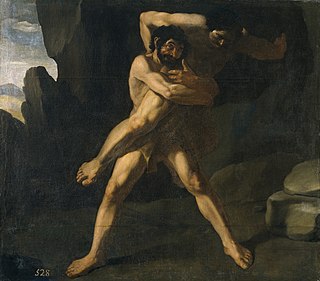
Antaeus, known to the Berbers as Anti, was a figure in Berber and Greek mythology. He was famed for his defeat by Heracles as part of the Labours of Hercules.
In Greek mythology, Deimos is the personification of fear. He is the son of Ares and Aphrodite, and the brother of Phobos. Deimos served to represent the feelings of dread and terror that befell those before a battle, while Phobos personified feelings of fear and panic in the midst of battle.

Phobos is the god and personification of fear and panic in Greek mythology. Phobos was the son of Ares and Aphrodite, and the brother of Deimos. He does not have a major role in mythology outside of being his father's attendant.
The name Astyoche or Astyocheia was attributed to the following individuals in Greek mythology:
Agelaus or Agelaos is, in Greek mythology, the name of various individuals.
In Greek mythology, Assaracus was a king of Dardania.
Dryas is the name of several figures in Greek mythology, including:
In Greek mythology, Alcaeus or Alkaios was the name of a number of different people:
In Greek mythology, Aesepus may refer to:
Perimedes was a name attributed to several characters in Greek mythology.
In Greek mythology, the Machae or Machai were the daemons (spirits) of battle and combat.
In Greek mythology, Hippasus or Hippasos is the name of fourteen characters.
Antimachus may refer to these persons in Greek mythology:
In Greek mythology, the Phonoi were the "ghastly-faced" male personifications of murder.
In Greek mythology, the Androctasiae or Androktasiai were the female personifications of manslaughter.
In Greek mythology, Palioxis was the personification of backrush, flight and retreat in battle. She and her sister Proioxis (Onrush) presided over the surge of battle. Palioxis was probably numbered amongst the Makhai, daimones of the battlefield.
In Greek mythology, Proioxis was the personification of onrush or pursuit in battle. She and her sister Palioxis (Backrush) presided over the surge of battle. They were probably numbered amongst the Makhai, daimones of the battlefield. Proioxis was probably the same as Ioke.
In Greek mythology, Nireus was a king of the island Syme and one of the Achaean leaders in the Trojan War.
In Greek mythology, the name Enyeus may refer to:
In Greek mythology, Molion may refer to the following personages:
 This article incorporates text from this source, which is in the public domain .
This article incorporates text from this source, which is in the public domain .
